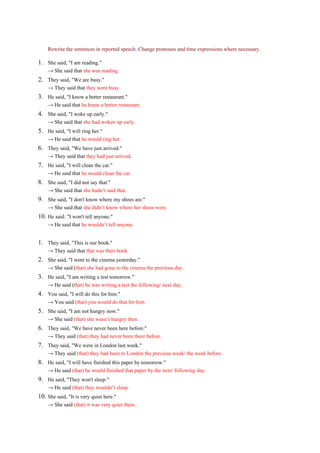
Answer key reported speech exercises
- 1. Rewrite the sentences in reported speech. Change pronouns and time expressions where necessary. 1. She said, "I am reading." → She said that she was reading. 2. They said, "We are busy." → They said that they were busy. 3. He said, "I know a better restaurant." → He said that he knew a better restaurant. 4. She said, "I woke up early." → She said that she had woken up early. 5. He said, "I will ring her." → He said that he would ring her. 6. They said, "We have just arrived." → They said that they had just arrived. 7. He said, "I will clean the car." → He said that he would clean the car. 8. She said, "I did not say that." → She said that she hadn’t said that. 9. She said, "I don't know where my shoes are." → She said that she didn’t know where her shoes were. 10. He said: "I won't tell anyone." → He said that he wouldn’t tell anyone. 1. They said, "This is our book." → They said that that was their book. 2. She said, "I went to the cinema yesterday." → She said (that) she had gone to the cinema the previous day. 3. He said, "I am writing a test tomorrow." → He said (that) he was writing a test the following/ next day. 4. You said, "I will do this for him." → You said (that) you would do that for him. 5. She said, "I am not hungry now." → She said (that) she wasn’t hungry then. 6. They said, "We have never been here before." → They said (that) they had never been there before. 7. They said, "We were in London last week." → They said (that) they had been to London the previous week/ the week before. 8. He said, "I will have finished this paper by tomorrow." → He said (that) he would finished that paper by the next/ following day. 9. He said, "They won't sleep." → He said (that) they wouldn’t sleep. 10. She said, "It is very quiet here." → She said (that) it was very quiet there.
- 2. 1. "Where is my umbrella?" she asked. → She asked where her umbrella was. 2. "How are you?" Martin asked us. → Martin asked us how we were. 3. He asked, "Do I have to do it?" → He asked if he had to do it. 4. "Where have you been?" the mother asked her daughter. → The mother asked her daughter where she had been. 5. "Which dress do you like best?" she asked her boyfriend. → She asked her boyfriend which dress he liked best. 6. "What are they doing?" she asked. → She wanted to know what they were doing. 7. "Are you going to the cinema?" he asked me. → He wanted to know if I was going to the cinema. 8. The teacher asked, "Who speaks English?" → The teacher wanted to know who spoke English. 9. "How do you know that?" she asked me. → She asked me How I knew that. 10. "Has Caron talked to Kevin?" my friend asked me. → My friend asked me if Caron had talked to kevin. 11. "What's the time?" he asked. → He wanted to know what the time was. 12. "When will we meet again?" she asked me. → She asked me when we would meet again. 13. "Are you crazy?" she asked him. → She asked him if he was crazy. 14. "Where did they live?" he asked. → He wanted to know where they had lived. 15. "Will you be at the party?" he asked her. → He asked her if she would be at the party. 16. "Can you meet me at the station?" she asked me. → She asked me to meet her at the station/ if I could meet her at the station. 17. "Who knows the answer?" the teacher asked. → The teacher wanted to know who knew the answer. 18. "Why don't you help me?" she asked him. → She wanted to know why he didn’t help her/ she asked him to help her. 19. "Did you see that car?" he asked me. → He asked me if I had seen that car. 20. "Have you tidied up your room?" the mother asked the twins. → The mother asked the twins if they had tidied up their room.